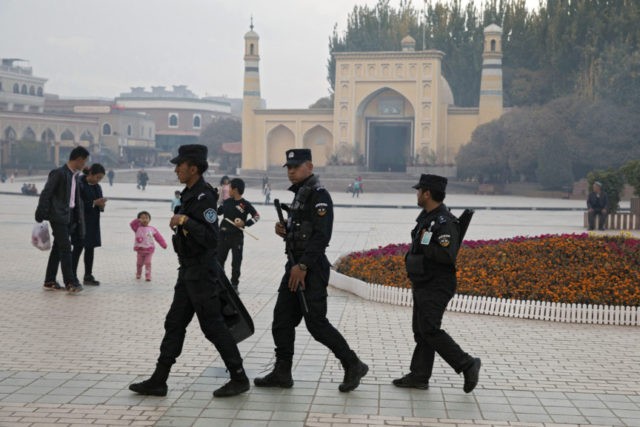The Chinese government published a policy paper on Monday claiming it has arrested 13,000 “terrorists” in Xinjiang province since 2014. The paper is part of China’s effort to defend the massive re-education camps that currently hold up to a million members of the Uighur population, a predominantly Muslim ethnic group.
Reuters summarized the latest claims made by Beijing:
Legal authorities have adopted a policy that “strikes the right balance between compassion and severity”, the government said in its white paper.
Since 2014, Xinjiang has “destroyed 1,588 violent and terrorist gangs, arrested 12,995 terrorists, seized 2,052 explosive devices, punished 30,645 people for 4,858 illegal religious activities, and confiscated 345,229 copies of illegal religious materials”, it added.
Only a small minority of people face strict punishment, such as ringleaders of terror groups, while those influenced by extremist thinking receive education and training to teach them the error of their ways, the paper said.
It also gave a breakdown of 30 attacks since 1990, with the last one recorded in December 2016, saying 458 people had died and at least 2,540 were wounded as a consequence of attacks and other unrest.
The Chinese paper essentially claimed the radical beliefs of Uighur extremists are not true Islam, so China cannot be accused of anti-Islamic activity by using re-education camps to deprogram the Uighurs.
The paper also challenged the Uighurs’ ethnic identity as a Turkic people in a clear slap at the modern Turkish government, which is the only major Muslim power to speak out against China’s treatment of Muslims in Xinjiang.
A spokesman for the World Uighur Congress denounced the paper as propaganda.
“Counter-terrorism is a political excuse to suppress the Uighurs. The real aim of the so-called de-radicalization is to eliminate faith and thoroughly carry out Sinification,” the Uighur group charged. “Sinification” in this context means China’s drive to subordinate all religion to the supreme authority of the Chinese Communist Party.
In a Washington Post op-ed on Monday, former Xinjiang resident Bahram Sintash accused China of attempting to methodically erase Uighur culture and “kill our identity.”
Sintash, whose father Qurban Mamut is a leading Uighur intellectual sent to the re-education camps a year ago, described efforts to preserve Uighur books and make their culture and music available online, despite efforts by Chinese censors to shut Uighur websites down.
“Our message is clear: We are not erasable,” he declared.
China’s main anti-corruption agency, the Central Commission for Discipline Inspection, on Saturday announced it would prosecute one of the highest-ranking ethnic Uighur officials in China for graft.
Nur Bekri, governor of Xinjiang from 2008 to 2014 and former director of the Chinese National Energy Administration, is accused of exploiting his position to accumulate “a huge amount of wealth.” He was also said to be “morally corrupt” because he “used his power for sex.”

COMMENTS
Please let us know if you're having issues with commenting.